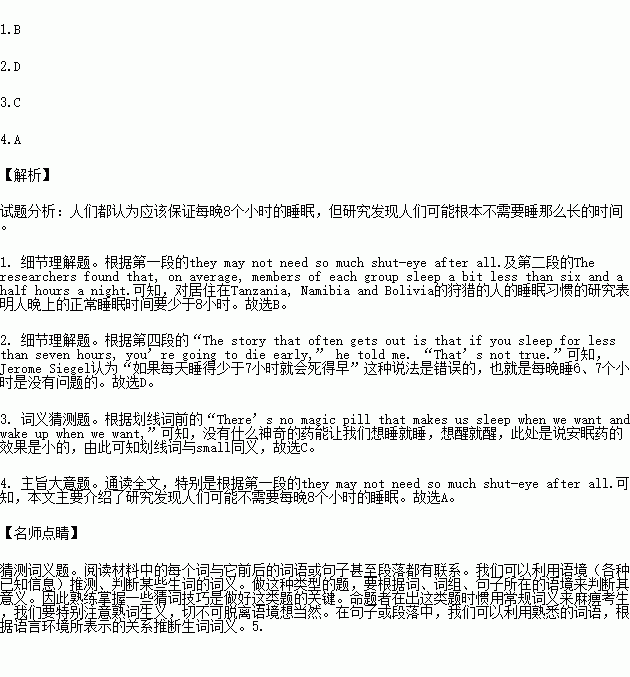题目内容
There was good news last week for people who struggle to get eight hours of sleep a night: they may not need so much shut-eye after all.
Researchers from UCLA and elsewhere looked at sleep habits of remote hunter-gatherers in Tanzania, Namibia and Bolivia — groups with pre-industrial lifestyles whose sleep patterns are believed to reflect those of ancient humans. The researchers found that, on average, members of each group sleep a bit less than six and a half hours a night.
The study, published in the academic journal Current Biology, indicates that “natural” sleep is less than eight hours a night and that modern society’s numerous electronic distractions (分心) aren’t necessarily to blame for people getting just six or seven hours of sleep.
“The story that often gets out is that if you sleep for less than seven hours, you’re going to die early,” he told me. “That’s not true.”
Yet Americans are addicted to getting more sleep — and on turning to medical shortcuts to help them.
According to the Centers for Disease Control, as many as 70 million U.S. adults suffer from sleep disorders or sleeplessness. Only a third of Americans get the government’s recommended seven to nine hours of sleep a night.
About 9 million American adults use sleeping pills to help get a good night’s rest, the CDC found. Siegel said the number of people relying on medicines “has gone up rather rapidly since then.”
Industry consulting firm GlobalData estimates that worldwide sales for sleeplessness medicines will run about $1.4 billion next year and reach $1.8 billion by 2023, recovering from lower sales in recent years because of cheaper generics(仿制药) hitting the market.
Dr. Roy Artal, a sleep specialist in West Los Angeles, said it’s understandable that busy people in today’s go-go world would turn to medicines to speed up the sleep process. But all they’re doing is building a reliance on powerful drugs for relatively little improvement.
“There’s no magic pill that makes us sleep when we want and wake up when we want,” Artal said. “The effects of sleeping pills tend to be modest.”
He and other experts say the answer to sleeplessness isn’t to be found in a pill bottle. It’s in what’s called “sleep hygiene (保健).”
1.The research on sleep habits of remote hunter-gatherers in Tanzania, Namibia and Bolivia shows that ________.
A. they have a lack of sleep because of their bad lifestyle
B. “natural” sleep may be less than eight hours a night
C. modern electronic products cause the sleeplessness
D. pre-industrial lifestyles will be helpful to a better sleep
2.Jerome Siegel believes that ________.
A. we need to take sleeping pills to improve sleep
B. modern electronic products do harm to a good sleep
C. those who sleep for less than 7 hours will die early
D. there is nothing wrong with a 6 or 7 hours’ sleep
3.The underlined word “modest” probably means ________.
A. obviousB. awfulC. smallD. large
4.The main idea of this passage is that ________.
A. people may not need eight hours of sleep a night
B. people need sleeping pills to have a good sleep
C. sleeping pills have a long way to go for sleep improvement
D. sleeping pill industry will suffer great losses from the new discovery
 暑假作业暑假快乐练西安出版社系列答案
暑假作业暑假快乐练西安出版社系列答案
